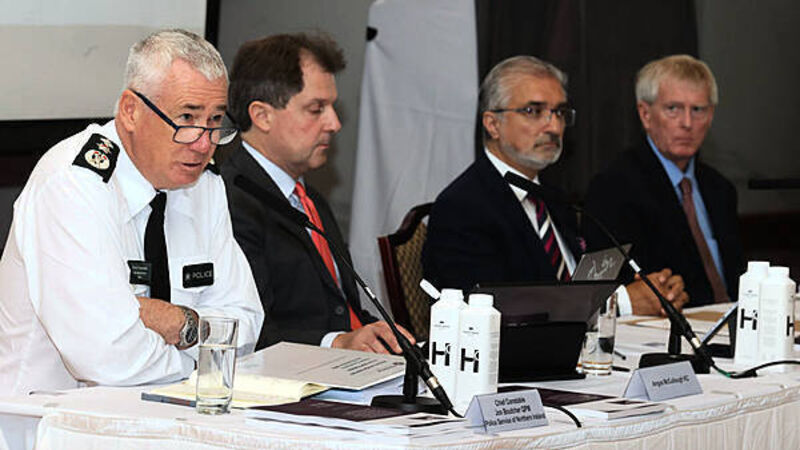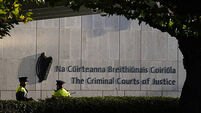Concern after review finds police in NI tried to identify journalists’ sources

By Jonathan McCambridge and David Young, PA
Police in Northern Ireland unlawfully used covert powers to attempt to uncover eight journalists’ sources, the author of a review has said.
The McCullough Review into surveillance practices in the Police Service of Northern Ireland (PSNI) found that attempts were made on 21 occasions to identify reporters’ sources prior to 2015.
The review also raised “significant concerns” about the PSNI conducting trawls of its own communications systems records in “an untargeted wholesale attempt to identify unauthorised contact between PSNI personnel and journalists”.
Amnesty International has said the report “exposes a disturbing pattern of unlawful covert surveillance of journalists”.
However, the covert surveillance of journalists and lawyers by police was not “widespread or systemic”, the review concluded.
PSNI Chief Constable Jon Boutcher said he welcomed the review and was committed to ensuring the force “does better” in the future.
Angus McCullough KC was commissioned by the PSNI to examine the issue after a tribunal last year ruled an undercover police operation to try to unmask the journalistic sources of two award-winning documentary makers was unlawful.

The Investigatory Powers Tribunal (IPT) quashed a decision made by former PSNI chief constable Sir George Hamilton to approve a directed surveillance authorisation (DSA) in an investigation into the leaking of a confidential document that appeared in a documentary on a Troubles massacre made by Trevor Birney and Barry McCaffrey.
The review, published on Wednesday, investigated covert measures used by police between January 2011 and November 2024.
The barrister said he had been given full access to PSNI records, systems and personnel.
The review examined PSNI applications for the use of Communications Data (CD), which it said does not involve access to the content of communications, but instead shows which numbers were in contact with each other and for how long.

Mr McCullough said: “The report identifies some specific cases in which I consider the covert measures are likely to have been authorised unlawfully.”
He said the applications “appear to have been made with the purpose of identifying a journalist’s source”.
He said this included Mr McCaffrey and seven other journalists. He said all the journalists, apart from one who had died, had been informed.
The report said in total 378 CD applications had been made relating to journalists in the time-frame, which included applications relating to bomb hoax or warning calls or situations were journalists had been the victim of crime.
Turning to the legal profession, Mr McCullough said he had found a single application for CD involving more than one lawyer which he regarded “inadequate to a degree that I doubt the legality of the authorisation in that case”.
The review also examined the practice of cross-checking journalists’ phone numbers against PSNI communication systems records, referred to as “washing through”.
I have found no basis for concerns that PSNI surveillance of journalists or lawyers is widespread or systemic”
It said this included the use of a list of more than 380 journalists’ contact numbers.
It said: “The scale of this practice, the duration over which it was carried out, and the apparent lack of any questioning as to the necessity or proportionality of a technique that seems to have been almost entirely ineffective in its aim of identifying inappropriate contact between PSNI officers and staff and journalists is troubling.
“I am relieved to find that the practice has been discontinued, having not been used since March 2023, and formally ended in May 2024.”
Mr McCullough said: “I have found no basis for concerns that PSNI surveillance of journalists or lawyers is widespread or systemic.”
He added: “Whilst, there is scope for improvement in PSNI’s practices in various identified respects, and some specific incidents where there has been what I consider to be a failure to comply with the relevant legal provisions, I can find no basis for any suggestion that the powers available to PSNI are being routinely abused in relation to journalists, lawyers or others of special status as identified in the terms of reference.”
The review also said that in the course of its investigations it had uncovered a “significant number” of digital files held by the PSNI which appeared to consist of data from devices seized from Mr McCaffrey and Mr Birney in 2018, and that their detention seemed to be a breach of orders made by the IPT.

It also said investigative reporter Donal MacIntyre, who is examining the circumstances surrounding the death and disappearance of Belfast schoolboy Noah Donohoe in 2020, had been the subject of a DSA.
However, it said this related to public posts on his X account and said there was no indication private communication between the journalist and Noah’s mother had been accessed by police.
Mr McCulllough said: “I have considerable concerns about the processes adopted in that case.”
The report said it had found direct surveillance had been used in relation to one other journalist and twice against a lawyer.
The review also dealt with reports that eight journalists in Northern Ireland had had their names run through a “standalone intelligence system” in 2017.

During the McCaffrey/Birney IPT hearings it was suggested by a lawyer that they had been targeted by the PSNI as “troublemaker journalists”.
The report said it did not believe any of the eight individuals was a practising journalist at the time.
The review makes 16 recommendations, including commissioning a supplementary report and the PSNI bringing together all the units responsible for the authorisation process for all forms of covert surveillance.
Responding to the report, Mr Boutcher said: “The report does not identify any issues of misconduct by individual officers.
“What it does identify is individual authorisations where we as a police service could have done better and I am committed to ensuring we do in the future.”
The review rightfully highlights that we have to improve our processes, and we will
He added: “I am pleased to learn that the review has found no basis for concerns that PSNI surveillance of journalists or lawyers is widespread or systemic.
“The review rightfully highlights that we have to improve our processes, and we will.
“I am aware of commentary calling for a public inquiry into these matters but this report shows that no such inquiry is necessary.”
Patrick Corrigan, Northern Ireland director of Amnesty International UK, said: “This report exposes a disturbing pattern of unlawful covert surveillance of journalists, with the PSNI showing clear disregard for press freedom and the rule of law.
“The scale of the wrongdoing is alarming, from repeated attempts to identify reporters’ sources to covert operations concealed from oversight bodies.
“But questions remain. How far has MI5 gone in unlawfully monitoring journalists in Northern Ireland?
“A free press simply cannot function under the shadow of state surveillance.
“That is why we are asking the Secretary of State to set up a full public inquiry. Only full disclosure can restore trust and safeguard the rights of journalists in Northern Ireland.”
Issues around police surveillance of journalists in Northern Ireland have attracted increasing scrutiny since the 2018 arrests of Mr McCaffrey and Mr Birney as part of a police investigation into the alleged leaking of a police watchdog document that appeared in a documentary they made on the 1994 loyalist paramilitary massacre in Loughinisland, Co Down.









